|
|
|
Sort Order |
|
|
|
Items / Page
|
|
|
|
|
|
|
| Srl | Item |
| 1 |
ID:
019660
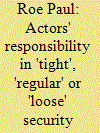

|
|
|
|
|
| Publication |
March 2001.
|
| Description |
103-116
|
|
|
|
|
|
|
|
|
|
|
|
|
|
|
|
| 2 |
ID:
132005
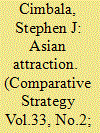

|
|
|
|
|
| Publication |
2014.
|
| Summary/Abstract |
The United States' military-strategic pivot toward Asia is motived by concerns about a rising China, about the increased significance of Asia on the world economic and political stages, and about the growing risks of nuclear proliferation and nuclear first use in that region. Nuclear Asia already numbers five acknowledged or de facto nuclear weapons states among its members: Russia, China, North Korea, India, and Pakistan. Failure to reverse North Korea's nuclear weapons status or political distrust among other powers may increase the number of Asian nuclear weapons states (including states with prospective nuclear-missile reach into Asia) to eight, creating an Asian-Middle Eastern nuclear arms race that defies containment. On the other hand, an alternative presents itself, in the form of a multilateral nuclear arms reduction agreement that would create three tiers of accepted nuclear weapons states and bar the door to new admits.
|
|
|
|
|
|
|
|
|
|
|
|
|
|
|
|
| 3 |
ID:
188302


|
|
|
|
|
| Summary/Abstract |
Following the 2014 Ukraine crisis, Belarus and Kazakhstan appear caught in an alliance security dilemma characterised by intra-alliance threat and entrapment, as both are potential targets of militarised hybrid warfare by their vastly more powerful ally, Russia. Despite having sought foreign policy flexibility between the two increasingly opposed geopolitical camps of the West and Russia, Minsk and Nur-Sultan appear drawn further towards Moscow. Utilising their pre- and post-2014 national security documents, reinforced by an examination of their rhetoric and policies, this essay demonstrates how both countries reassessed their security environment in the wake of the annexation of Crimea and the initial war in the Donbas region.
|
|
|
|
|
|
|
|
|
|
|
|
|
|
|
|
| 4 |
ID:
133890
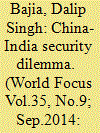

|
|
|
|
|
| Publication |
2014.
|
| Summary/Abstract |
China and India remain locked in a stagnant embrace when it comes to the most intractable of security dilemmas: the Sino-Indian border issue. A closer look at Chinese and Indian strategic, scientific and academic experts' security perceptions vis-a-vis one another reveals that there is mueh more to the Sino-Indian security dynamic than meets the eye. Chinese and Indian strategic analysts hold divergent interests when evaluating each other's military modernization, the former preoccupied with India's naval development and the latter with China's army. Technical analysts in each country share a similar level of interest in the other's aviation and aerospace programs.
|
|
|
|
|
|
|
|
|
|
|
|
|
|
|
|
| 5 |
ID:
133894
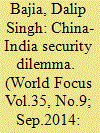

|
|
|
|
|
| Publication |
2014.
|
| Summary/Abstract |
China and India remain locked in a stagnant embrace when it comes to the most intractable of security dilemmas: the Sino-Indian border issue. A closer look at Chinese and Indian strategic, scientific and academic experts' security perceptions vis-a-vis one another reveals that there is mueh more to the Sino-Indian security dynamic than meets the eye. Chinese and Indian strategic analysts hold divergent interests when evaluating each other's military modernization, the former preoccupied with India's naval development and the latter with China's army. Technical analysts in each country share a similar level of interest in the other's aviation and aerospace programs.
|
|
|
|
|
|
|
|
|
|
|
|
|
|
|
|
| 6 |
ID:
128921
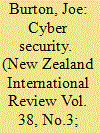

|
|
|
| 7 |
ID:
127771
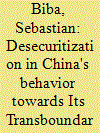

|
|
|
|
|
| Publication |
2014.
|
| Summary/Abstract |
Fresh water has no substitute, and its availability has been declining sharply around the globe. In Asia, China's role as a multidirectional and transborder water provider is unmatched. Analysis of China's behavior towards its transboundary rivers is therefore pivotal. By examining three different case studies-the Mekong River in Southeast Asia, the Brahmaputra River in South Asia and the Irtysh and Ili Rivers in Central Asia-this article seeks to lay the theoretical groundwork for understanding China's behavior. It pits previously applied realist rationales against the more recent notion of desecuritization strategies and makes a case for the latter. While desecuritization implies non- or de-escalation, it does not necessarily mean genuine long-term cooperation. The future of Asia's shared waters may thus be a contentious one.
|
|
|
|
|
|
|
|
|
|
|
|
|
|
|
|
| 8 |
ID:
129795
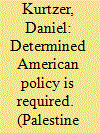

|
|
|
|
|
| Publication |
2014.
|
| Summary/Abstract |
U.S. Secretary of State John Kerry has done an admirable job of creating an "architecture of peace" to support the negotiations launched in July 2013. He engineered the appointment of retired U.S. General John Allen to delve deeply into Israel's security requirements following a peace treaty, recognizing that the security dilemmas would range far beyond the immediate challenges of securing an Israeli-Palestinian border. Kerry understood that Israel's readiness to take the risks associated with withdrawal from the Occupied Palestinian Territories (OPT) would be influenced directly by the degree to which Israel's security requirements were taken into account.
|
|
|
|
|
|
|
|
|
|
|
|
|
|
|
|
| 9 |
ID:
107164
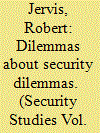

|
|
|
| 10 |
ID:
115313
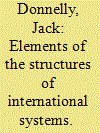

|
|
|
| 11 |
ID:
030541
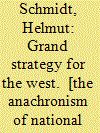

|
|
|
|
|
| Publication |
New Haven, Yale University Press, 1985.
|
| Description |
xviii,159p.Hbk
|
| Standard Number |
0300035357
|
|
|
|
|
|
|
|
|
|
|
|
Copies: C:1/I:0,R:0,Q:0
Circulation
| Accession# | Call# | Current Location | Status | Policy | Location |
| 026397 | 909.827/SCH 026397 | Main | On Shelf | General | |
|
|
|
|
| 12 |
ID:
128925
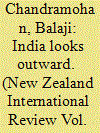

|
|
|
| 13 |
ID:
190778
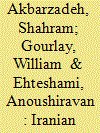

|
|
|
|
|
| Summary/Abstract |
This article examines Iran’s ‘forward-defence’ strategy, in particular its deployment of proxy forces in the Syrian conflict. Iran’s expanded presence in regional conflicts is regarded by its adversaries as indication of hegemonic intent, while Tehran posits its regional posture as a defensive response to security threats. We argue that Iran’s ‘forward-defence’ strategy offers practical benefits, shaping strategic realities, and performative benefits, allowing Tehran to propagate a discourse of military fortitude. On balance, however, the strategy has fed suspicions of Iran’s intentions and increased hostility towards the Iranian leadership, thus is likely to be counterproductive.
|
|
|
|
|
|
|
|
|
|
|
|
|
|
|
|
| 14 |
ID:
104074


|
|
|
|
|
| Publication |
2011.
|
| Summary/Abstract |
International Relations (IR) theory grants a privileged place to uncertainty. In practice, however, the problem does not seem to be uncertainty but certainty: if only the decision makers would acknowledge uncertainty, conflict might somehow be avoided. We challenge the "uncertainty bias" of IR scholarship by developing misplaced certainty as a distinct and common pathway to war. By misplaced certainty we mean cases where decision makers are confident that they know each other's capabilities, intentions, or both; but their confidence is unwarranted yet persists even in the face of disconfirming evidence. We argue that misplaced certainty drives two familiar conflict pathways thought to depend on uncertainty: security dilemmas and spirals. We then conceptualize misplaced certainty, highlighting its affective dimension. Building on the work of post-Keynesian economists and economic sociologists we articulate the dynamics of certainty production and how it can go awry. Our "confidence model" of certainty can account for both the phenomenology and frequency of misplaced certainty, particularly in conflict situations, while providing social theoretical underpinnings to the Classical Realist admonition of prudence.
|
|
|
|
|
|
|
|
|
|
|
|
|
|
|
|
| 15 |
ID:
131997
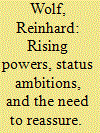

|
|
|
|
|
| Publication |
2014.
|
| Summary/Abstract |
This article focuses on the ominous parallels between the rise of Germany before World War I and China's ongoing ascendance. It will demonstrate that concerns about national status strongly affected both the fateful escalation of the 1914 crisis and the growing antagonisms of the years preceding. Special emphasis will be given to the role that mutual 'misrecognition' played in the gradual deterioration of Anglo-German relations. The consequences of Germany's excessive fixation on status are highly relevant for contemporary China, due to the startling similarities between both countries' domestic and international settings. If China wants to avoid the policy errors that led to the Kaiserreich's self-encirclement it needs to pay more attention to dangerous feedbacks among ongoing power shifts, maritime security dilemmas and extravagant public status concerns. China should do more to ensure that external trust in its benign intentions grows faster than its international ambitions and military power. This requires, among other things, an early settlement of ongoing territorial disputes, a toning down of jingoistic domestic discourses, enhanced leeway for speakers advocating international cooperation, and higher investment in multilateral institutions. Beijing's partners, for their part, must encourage such self-binding policies by facilitating China's rise in status, specifically by giving Beijing a greater say in these institutions
|
|
|
|
|
|
|
|
|
|
|
|
|
|
|
|
| 16 |
ID:
127770
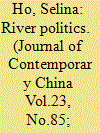

|
|
|
|
|
| Publication |
2014.
|
| Summary/Abstract |
China manages its transboundary rivers as a subset of its broader relations with other riparian states. This results in discernible differences in the way China approaches its international river systems. Although there is a limit to the extent of Chinese cooperation, in relative terms China is more cooperative in the Mekong than in the Brahmaputra. To China, Southeast Asian states are part of a hierarchical system where it stands at the apex. While problems exist, there are deep linkages between them, which help foster collaboration in the Mekong. India, which has greater power parity with China, is not part of China's hierarchical worldview. The territorial disputes and security dilemmas that characterize South Asian geopolitics further impede cooperation. Domestic considerations also impact on China's river policies. There is greater consensus among Chinese policymakers in managing the Mekong than the Brahmaputra, which explains the higher degree of clarity in Chinese policies towards the former compared to the latter.
|
|
|
|
|
|
|
|
|
|
|
|
|
|
|
|
| 17 |
ID:
146846
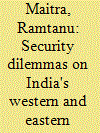

|
|
|
| 18 |
ID:
128234
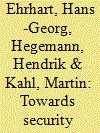

|
|
|
|
|
| Publication |
2014.
|
| Summary/Abstract |
This article argues that security governance can and should be reframed as a critical tool that enables us to understand and reappraise concrete practices of security provision. Security governance needs to move beyond the functional mapping of different governing arrangements and the presumption that security governance leads to effective and legitimate problem-solving in a quasi-automatic manner. In this article, we propose a framework that identifies the essential characteristics of security governance and turns them into critical questions with the aim to reveal persisting frictions and dilemmas. First, we trace the rise of security governance as concept and practice over the past decade and identify its central characteristics with regard to prerequisites, structures and consequences. Second, we reframe the core characteristics of security governance into critical questions and thereby develop an understanding of security governance as a critical tool. Finally, we illustrate the relevance of this approach with examples from EU security governance.
|
|
|
|
|
|
|
|
|
|
|
|
|
|
|
|
| 19 |
ID:
098320
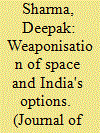

|
|
|
|
|
| Publication |
2010.
|
| Summary/Abstract |
During Cold War era, space became an essential adjunct for war-fighting on
the ground, without becoming another theatre of combat. While militarization
of space proceeded rapidly, the weaponisation of space was avoided. Because
the weaponisation of space was avoided during the Cold War, it does not
necessarily follow that weaponisation will continue to be avoided in a new era
of asymmetric warfare. We can improve protection of satellites against some
threats, but satellites will remain easy targets for space weapons designed to
kill on impact. Space has been free from warfare. No weapons have ever been
used in or from space, and no satellites have been destroyed in combat. A
glance at the global strategic situation reveals that many nations are rushing
to develop space capability. The capabilities in development around the world
are largely dual use and will have profound effects on the balance of power.
The issue at hand is how to effectively manage the security dilemmas that
will inevitably arise due to weaponisation of space. Many space faring nations
think that future wars will/may be fought in all medium including space. The
laws of aerodynamics cease to apply in space and one is therefore obliged to
consider it as a medium different from air. It is still far easier and more likely
for surprise attacks to be carried out on the ground than in space. During the
Cold War, nuclear-tipped missiles were always ready to fire. We will be safer if
we can prevent elevating this hair-trigger situation into space. If India has to
look at the threat to its space assets, it can be concluded that though there is
a threat to space assets from our perceived adversary, it is neither critical nor
alarming. Indian defence forces primary dependence on space based systems
if any, can easily be transformed to secondly by developing alternates for both
ground and aerial platforms. In future the dependence on space based systems
can be further reduced by India by inducting state-of-the-art alternate systems
to supplement the space system as alternates.
|
|
|
|
|
|
|
|
|
|
|
|
|
|
|
|
| 20 |
ID:
124183
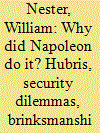

|
|
|
|
|
| Publication |
2013.
|
| Summary/Abstract |
This article explores the geopolitical and psychological reasons behind Napoleon's invasion of Russia.
|
|
|
|
|
|
|
|
|
|
|
|
|
|
|
|
|
|
|
|
|